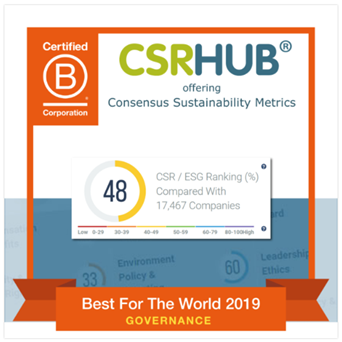Our firm, CSRHUB, recently decided to become a B Corporation. We filled out a survey, went through several rounds of review, and thought deeply about some of the issues the process exposed. We always believed we were a positive and progressive company. We were pleased that our values fit well with those set out by this widely-respected and well-tested standard.
B Corps use the power of business to solve social and environmental problems. Unlike traditional corporations, B Corps agree to meet social and environmental performance standards, disclose their performance so that it is transparent, and include consideration of all stakeholder interests in their legal structure.
Now that we have been through the B Corp process, I wanted to offer anyone who is thinking about it, three reasons for becoming a B Corp:
- The power of reporting. If you report it, you can measure it. If you can measure it, you can improve it. All businesses need to build a feedback loop that helps them improve their long term value. We could never have built our tool if we did not have thousands of self-reported reports from the companies we rate, to work with. Our society is based on the sharing of ideas and information. Be a part of it and make your fair contribution.
- You benefit from using a tested process. When you run a business, you get immersed in its day to day issues. You can lose sight of what is important—the reasons you started it and have worked so hard to build it. The B Corp interview was a check list—like making sure the engines on a plane can hit full throttle and that the rudder moves, before you start down the runway. You want your plane to climb high and fly fast—and you need to be sure your engines are hitting on all cylinders and nothing is stuck in the tail, before you leave the ground.
- You get to take a stand. Our profile system requires people to make decisions about how they feel about issues. Are they against involvement in Burma? In favor of nuclear power? What is most important, good governance or good labor practices? By becoming a B Corp, I felt we were publicly committing to the principle that businesses can both do well and be an agent for positive change. (See a previous post on the concept of the “virtuous quadrant.”) The B Corp community now includes 353 companies. You can be proud to belong to this group.
It is easier not to report, not to examine one’s own prejudices and practices, and not to state one’s views publicly. However, the issues addressed by the B Corp process—and by the whole area of CSR and sustainability practice and theory—can’t be avoided. We are part of a community that intends to change the world and we need to show that we have whole-hearted dedication to our cause. How could we or any other business who believes as we do, not want to engage in this process?
